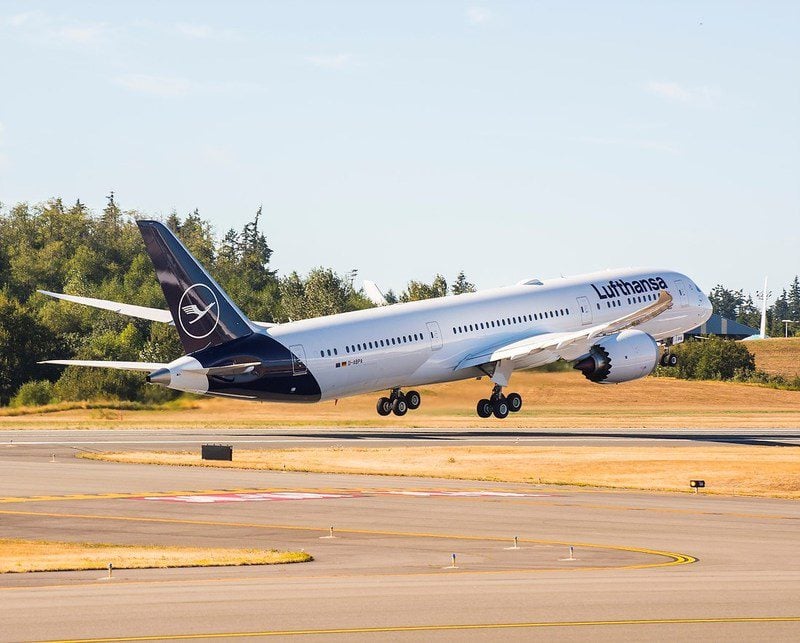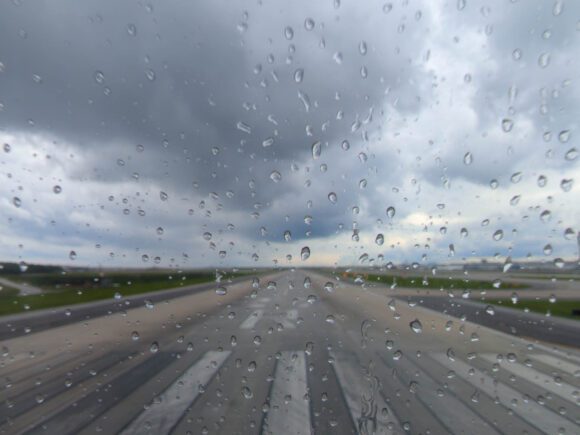
Lufthansa
UPDATE – Lufthansa Group returned to profitability in 2022 and has left the Covid-crisis behind it. The airline group reported a consolidated net profit of €791 million, which puts its ahead of its main European rivals Air France-KLM (€728 million) and International Airlines Group (€431 million).
The net profit compares to a €-2.191 billion net loss in 2021. Adjusted EBIT was €1.509 billion compared to €-1.666 billion. Revenues grew by 95 percent to €32.770 billion, up from €16.811 billion. Lufthansa, Eurowings, Eurowings Discover, SWISS, Edelweiss, Austrian Airlines, Brussels Airlines, and Air Dolomiti carried a combined 101.7 million passengers, up from 47 million in 2021.
“The Lufthansa Group put the coronavirus pandemic behind it in the 2022 financial year. The recovery in demand was far stronger and unfolded far more rapidly than industry experts had anticipated at the start of the year, prompting us to significantly expand our capacities again. Overall, in the past year we once again welcomed more than 100 million passengers on board our aircraft,” CEO Carsten Spohr said, who has been re-appointed for a third term until 2028.
“Nevertheless 2022 was a challenging year. The start of the year was still impacted by the spread of the Omicron coronavirus variant. However, shortly thereafter demand picked up enormously and capacities were expanded so strongly within the span of a few months that the global air traffic system was at times overstretched during the summer months. This was mainly attributable to personnel shortages affecting airports, ground handling service providers, air traffic control and airlines. In addition, the war in Ukraine caused a significant rise in fuel prices.”
By airline
Looking by airline, parent airline Lufthansa was still loss-making in 2022 and produced an Adjusted EBIT of €-466 million compared to €-2.268 billion in 2021. Revenues grew by 160 percent to €13.173 billion but operating expenses were higher at €14.228 billion. Not helpful were a number of strikes, although the airline has concluded important collective agreements with unions. Lufthansa operated at seventy percent of its 2019 capacity, which was up eighty percent year on year.
SWISS and its subsidiary Edelweiss were the most profitable airlines within the group, reporting an Adjusted EBIT of €476 million compared to €-395 million in the previous year, thanks to the strong recovery of passenger traffic and strong cargo results. Adjusted EBIT margins returned to double-digits for the first time since the pandemic. Revenues increased by 129 percent to €4.805 billion which outpaced expenses of €4.501. The airline under CEO Dieter Vranckx was reaping the fruits of its cost restructurings in the past two years that improved efficiency. Stable operations contributed to the strong results. SWISS and Edelweiss carried 15.1 million passengers, up from 7.1 the previous year.
Like parent Lufthansa, SWISS and Austrian Airlines have repaid all state aid that was provided during the past Covid years. The €210 million in state-backed loans was redeemed three years earlier than planned. Austrian produced a tiny €3 million Adjusted EBIT but that is a significant step over €-249 million in 2021. It carried 11.1 million passengers who generated €1.871 billion in revenues, up 152 percent from the previous year. CEO Annette Mann attributed the result to a “solid summer season that won us back passengers” together with higher yields. Especially from Q2, demand for leisure travel recovered quickly. Austrian received the first two Airbus A320neo’s, with two more to follow this year.
SWISS will introduce its own version of the Allegris premium cabins in 2025. This is SWISS Business, which will be on the Airbus A330-300 first. (SWISS)
Brussels Airlines produced a €-74 million Adjusted EBIT, an improvement over €-178 million in 2021. Revenues grew by 117 percent to €1.217 billion. The airline successfully completed its REBOOT cost-saving plan that has prepared it for future growth and strengthening its market position, although efforts continue to improve unit costs. The airline carried 6.8 million passengers but was affected by six days of strikes at its Brussels Airport hub. Except for the usual increases in expenses, a twelve-percent automatic inflation indexation pushed on the Belgian carrier.
Eurowings also remained loss-making at €-197 million compared to an Adjusted EBIT of €-226 million in 2021. Revenues grew by 126 percent to €1.857 billion from 17 million passengers, but operating expenses were higher at €2.262 billion, mainly caused by the increase in capacity as it grew back to 85 percent of pre-pandemic levels. The airline continued its recruitment efforts and hired 750 new staff last year. Results of Discover are included in Lufthansa’s numbers.
Cargo and Technik
Lufthansa Cargo had another very strong year and reported an Adjusted EBIT of €1.600 billion, up from €1.495 billion. Revenues increased 22 percent to €4.627 billion. Thanks to capacity constraints, yields remained high, although the cargo market has seen a softening in demand in the second half of 2022. Full freighter capacity was down, but overall capacity grew by seventeen percent year on year thanks to the availability of more belly space. Lufthansa Cargo will double its Airbus A321P2F fleet to four aircraft this year.
Lufthansa Technik benefitted from increased flying activities and demand for more maintenance, producing an Adjusted EBIT of €511 million versus €362 million in 2021. Revenues increased by 39 percent to €5.6 billion. Lufthansa is preparing a partial sale of LH Technik, in line with previous plans. Talks with selected partners have already started. The airline group also plans to sell off its remaining part of catering partner LSG and AirPlus.
Focus
Lufthansa’s focus for 2023 is on improving its premium products, which it will do with the introduction of the new Allegris cabins later in the year on the Boeing 787. Except for different colors, SWISS will introduce the same cabin in 2025 as SWISS Senses on the Airbus A330-300, the Boeing 777-300ER, and later on newly delivered Airbus A350-900s. Improving customer satisfaction is another target.
Thanks to strong forward bookings in Europe and North America, 2023 should produce a significant improvement in Adjusted EBIT. The reopening of China and higher demand for Japan should become evident in the results later during the year. Capacity will be built back to 85-90 percent of 2019 levels this year and to 95 percent next year when CFO Remco Steenbergen targets an Adjusted EBIT margin of eight percent.
This will highly depend on bottlenecks, which are predicted in the European aviation system including airline and airport capacity, air traffic management, and the availability of aircraft. Spohr is concerned if Frankfurt Airport, its main hub, can cope with the added capacity this year: “It will be a challenge if we can meet our capacity requirements. That’s why we are in constant dialogue with the airport and have moved some capacity to other hubs to reduce the pressure on Frankfurt.” Media reports that Lufthansa will cut 34.000 flights from its schedule are not correct, Spohr said, although he admitted that a number of flights that were not bookable yet have been removed from the system. SWISS is also taking a conservative approach to capacity and expects to operate at 85 percent this year.
Lufthansa Group intends to recruit 12.000 new staff this year, including 3.000 cabin crew and 1.500 ground staff. This will grow the workforce to 115.000, up from 105.000 in 2021. The net recruitments will be 5.500 as some 6.500 staff will retire this year. Brussels Airlines still has 100 vacancies after recruiting 300 employees last year,
The cost reduction plan that targets €3.5 billion in structural annual savings by 2024 is ninety percent complete. Liquidity stood at €10.4 billion in December, including a €2.1 billion sustainability-linked revolving credit facility. Net debt was €8.9 billion, down from €15.6 billion the year before. Debt includes €2.0 billion in pension liabilities. Capex will be around €2.5 to €3.0 billion.
Fleet rationalization
With the order for 22 widebodies (ten Airbus A350-1000, five A350-900, seven Boeing 787-9) announced on Thursday, Lufthansa said that it will phase out six older types in the coming years: the Airbus A330-200, A340-300, A340-600, Boeing 767-300ER, Boeing 777-200, and Boeing 747-400. In the ‘new normal’, there remains a place for the 747-8I, which is producing very good yields in premium and cargo. Spohr referred to the aircraft as being in the ‘sweet spot.’
The A380 will remain in service until Lufthansa takes delivery of the A350-1000s and Boeing 777-9s, although Spohr said that “probably even Boeing itself doesn’t know when this aircraft will be delivered.” Two A380s have been brought back out of storage in Teruel and are being prepared for the summer schedule, with another two to follow before the summer. The fleet plan says that two more will be added for the 2024 season, which would bring the fleet to six aircraft. They will be based in Munich, which will also be the airport where the A350-1000s will be based. Spohr said that these aircraft will be delivered “sooner than expected”, but didn’t put a date on this.
Views: 19





